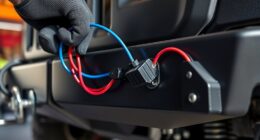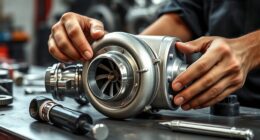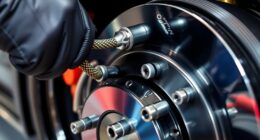If you want to enhance your 2004 Hyundai Elantra's power, you've got several effective tuning options. Start with a cold air intake and a performance exhaust system to improve airflow and add a few extra horsepower. For significant gains, consider a turbocharger or supercharger—these can potentially double your engine's output. Upgrading your ECU is also essential to optimize these modifications. Remember, while these adjustments can elevate performance, they often come with a hefty price tag. Stay tuned for insights on cost-effective modifications that can elevate your driving experience while maintaining reliability.
Key Takeaways
- Start with basic modifications like a cold air intake or performance exhaust to achieve minor horsepower gains and improved fuel economy.
- Consider forced induction, such as a turbocharger, for significant power increases, but be prepared for costs exceeding $12K.
- Upgrade suspension components, like performance shocks and springs, to enhance handling and stability, improving the overall driving experience.
- Invest in high-performance tires for better grip and traction, which can significantly transform handling dynamics during spirited driving.
- Research and understand the limitations of the CVVT system to avoid complications with ECU tuning and maximize performance potential.
Engine Performance Upgrades
When it comes to enhancing your 2004 Hyundai Elantra's performance, engine upgrades can make a significant difference. One of the most effective ways to boost power is by installing a turbocharger or supercharger, potentially doubling your engine's output and giving you quicker acceleration.
Another straightforward upgrade is a cold air intake, which enhances airflow, improves gas mileage, and offers you marginal gains in horsepower, making your driving experience more responsive.
Consider adding a performance exhaust system, like the EvoFusion, which can provide around 10 additional horsepower while also enhancing your car's sound and appearance. If you're looking for even more power, installing headers can further improve exhaust flow, increasing both horsepower and torque.
These engine performance upgrades can transform your Elantra, but remember that achieving substantial horsepower increases, such as reaching 280 hp from a stock 140 hp engine, often requires significant investment.
It's crucial to weigh the costs against the performance benefits to confirm you're making the right choice for your vehicle. So, engage with these upgrades, and feel the difference as you hit the road!
Evaluating Modification Costs
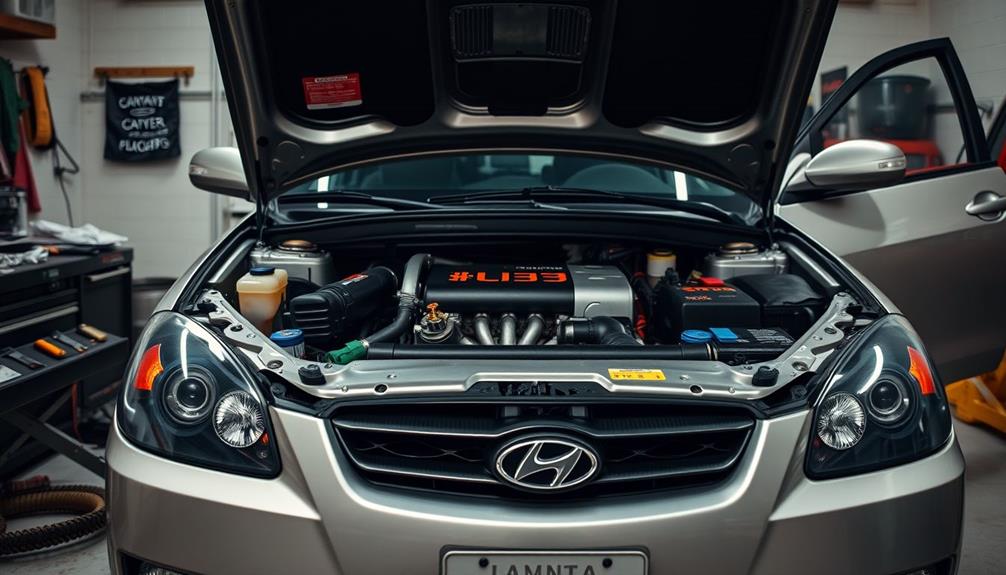
Before diving into performance upgrades for your 2004 Hyundai Elantra, it's essential to evaluate the costs involved. Modifying your Elantra to achieve significant gains, like reaching 280 hp from a stock 140 hp, could set you back upwards of $12K. This includes necessary upgrades such as forced induction and aftermarket ECU tuning.
If you're considering basic modifications, be prepared to invest between $4K and $13K for improvements from cold air intakes, exhaust systems, and headers.
Keep in mind that non-turbo modifications usually yield limited horsepower increases, with naturally aspirated engines capping at around 152 hp. For serious performance enthusiasts, forced induction is often recommended.
However, investing in performance parts doesn't always guarantee your satisfaction or a proportional increase in resale value. Many enthusiasts find that the high expenditures on mods may leave the Elantra perceived as a lower-tier vehicle.
Given the substantial modification costs, you might want to weigh the option of purchasing a more powerful vehicle, like a Corvette, instead of investing heavily in your Elantra. This could ultimately provide a more satisfying driving experience without the extensive financial commitment.
Challenges in Tuning
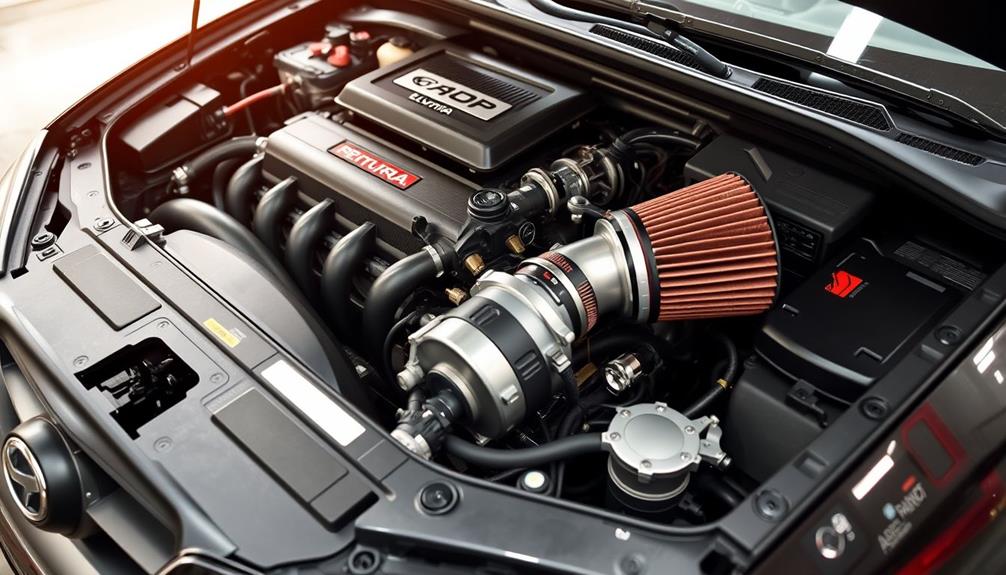
When tuning your 2004 Elantra, you'll quickly notice the limitations imposed by the ECU and its CVVT system, which can frustrate your modification efforts.
It's also important to contemplate that many upgrades, like headers and exhaust systems, might only yield small power gains, making the complexity of tuning feel even more intimidating.
Plus, weighing the costs against the potential benefits can leave you questioning if the investment is truly worth it.
ECU Limitations
Tuning the 2004 Hyundai Elantra presents several challenges, primarily due to the limitations of its factory ECU. The Elantra utilizes Continuous Variable Valve Timing (CVVT), which means the ECU plays a vital role in controlling engine timing and performance. This design aims to meet emissions standards, often working against your performance modifications.
Without options like turbochargers or superchargers, you're likely to face restricted horsepower gains; the maximum achievable is around 152 hp. These ECU limitations can frustrate your tuning efforts, as the factory settings may negate aftermarket upgrades.
If you're serious about enhancing performance, investing in an aftermarket ECU or a manifold absolute pressure (MAP) sensor can help you better manage modifications and optimize engine performance.
However, keep in mind that modifications aimed at increasing horsepower often lead to diminishing returns, impacting both your vehicle's reliability and compliance with emissions regulations.
It's important to weigh these challenges carefully when considering how far you want to push your Elantra's performance. With the right approach and tools, you can navigate these limitations, but it requires strategic planning and investment.
2. Modifications Complexity
Modifications for the 2004 Hyundai Elantra can be quite complex, primarily due to the intricacies of its continuously variable valve timing (CVVT) system.
This technology makes engine tuning more challenging, as it requires specialized knowledge to enhance performance effectively. You might find that the engine control unit (ECU) often counteracts your modifications to comply with emissions standards, limiting the overall effectiveness of your tuning efforts.
Achieving significant horsepower gains without forced induction, like turbocharging or supercharging, is tough, as naturally aspirated modifications typically max out around 152 hp.
While aftermarket parts like headers and cold air intakes can help, they often necessitate the installation of an aftermarket ECU or a manifold absolute pressure (MAP) sensor for ideal results.
Keep in mind that any potential performance enhancements come with a hefty price tag, sometimes exceeding $12,000 for substantial upgrades.
This makes the modifications complexity not just a technical hurdle but also a financial consideration for enthusiasts.
Balancing your desire for power with these challenges is essential when tuning your Elantra.
3. Cost Vs. Benefit
Investing in performance upgrades for your 2004 Hyundai Elantra can feel like a gamble, especially when the costs soar into the tens of thousands. You need to weigh the cost vs. benefit carefully before diving in. Here are some considerations to keep in mind:
- High Initial Investment: Significant horsepower gains can exceed $12,000, making this a steep financial commitment.
- Limited Gains: Basic performance modifications like cold air intakes and exhaust systems might only give you an additional 5-10 hp, which often doesn't justify the expense.
- ECU Complications: The vehicle's ECU can limit modifications to maintain emissions compliance, complicating your enhancement efforts.
- Warranty and Reliability Risks: Extensive modifications can void warranties and potentially lead to reliability issues, raising concerns about the long-term viability of your investment.
When considering performance modifications, it's essential to balance the potential power improvements against the substantial costs involved.
Make sure you're aware of how much you're willing to spend and what you're realistically going to gain from those upgrades.
Essential Modifications to Consider

When it comes to enhancing your 2004 Hyundai Elantra's performance, several essential upgrades can make a noticeable difference. Start with a cold air intake, which can improve fuel economy and provide a slight boost in acceleration, often yielding a 5-10 hp increase. Next, consider upgrading to a performance exhaust system like EvoFusion; this can add around 10 hp while also enhancing your engine's sound and aesthetics.
Here's a quick overview of the essential modifications:
| Modification | Benefits |
|---|---|
| Cold Air Intake | Improves fuel economy, +5-10 hp |
| Performance Exhaust System | +10 hp, better sound, improved aesthetics |
| Headers | Enhances exhaust flow, more responsive |
| High-Volume Fuel Pump | Optimizes fuel delivery for mods |
To maximize these upgrades, pair them with high-volume fuel injectors. If you're looking for significant power gains, consider forced induction options like a turbocharger, but be prepared for a hefty investment exceeding $12K. These modifications will not only improve your Elantra's performance but also enhance your overall driving experience.
Community Insights and Experiences

After exploring key upgrades for your 2004 Hyundai Elantra, it's valuable to reflect on what fellow enthusiasts have experienced in their tuning journeys. The Elantra community often shares mixed opinions on performance tuning, suggesting you start with minor modifications before diving into significant upgrades.
Here are some insights to ponder:
- Start Small: Many recommend beginning with simple mods like cold air intakes or upgraded exhaust systems.
- Handle with Care: Enthusiasts frequently stress that handling improvements, such as suspension upgrades, can dramatically enhance your driving experience.
- Realistic Goals: Be prepared for modest horsepower gains; non-turbo mods typically max out around 152 hp.
- Budget Wisely: Meaningful performance enhancements often exceed $12K, and you mightn't see a proportional return on your investment.
While some members have successfully achieved impressive performance upgrades, many face challenges related to reliability and ECU complexities.
Types of Modifications

There are various types of modifications you can consider for your 2004 Hyundai Elantra, each catering to different aspects of performance and aesthetics. Understanding these options will help you choose the best fit for your goals.
Here's a quick overview of some popular modifications:
| Type of Modification | Description |
|---|---|
| Cosmetic Modifications | Body kits and custom paint jobs to enhance visuals. |
| Performance Modifications | Turbo kits, exhaust systems, and headers for power. |
| Engine Modifications | Non-turbo upgrades for limited horsepower gains. |
| Suspension Upgrades | Enhancements for better handling and driving dynamics. |
Cosmetic modifications are generally cost-effective, with many options priced under $1,000. In contrast, performance modifications might require a significant investment, ranging from $13K to $20K, especially if you're eyeing turbo kits or exhaust systems. While engine modifications provide some power boost, you'll find that natural aspiration engines typically max out around 152 hp without forced induction. Ultimately, balancing your budget and desired outcomes will guide you in selecting the right modifications for your Elantra.
Enhancing Handling and Performance

To truly enhance your 2004 Hyundai Elantra's handling and performance, consider upgrading the suspension system with performance shocks and struts.
You can also boost engine efficiency with modifications like a cold air intake and high-performance exhaust.
Don't forget about the importance of high-performance tires, which can greatly improve grip and traction for a more dynamic driving experience.
Suspension Upgrades Benefits
Upgrading the suspension on your 2004 Hyundai Elantra can transform your driving experience, making it more dynamic and engaging.
With the right suspension upgrades, you'll notice a significant improvement in handling and cornering. Here's how these enhancements can elevate your ride:
- Performance Shocks: These provide better ride quality and stability, minimizing body roll during turns.
- Lowering Springs: By lowering your vehicle's center of gravity, you'll experience improved traction and handling, especially during acceleration and braking.
- Upgraded Sway Bars: These reduce understeer and oversteer, promoting better balance and predictability when tackling corners at higher speeds.
- Adjustable Coilovers: These allow you to customize ride height and damping settings, tailoring the suspension setup to your driving style.
Investing in these suspension upgrades not only enhances performance but also boosts your confidence behind the wheel.
You'll enjoy a more responsive driving experience, allowing you to tackle the road with ease.
Engine Modifications Overview
Enhancing your 2004 Hyundai Elantra's handling goes hand in hand with engine modifications that boost performance. To start, consider upgrading to a cold air intake and an aftermarket exhaust system. These engine modifications can add about 10 hp and improve overall engine efficiency.
If you're aiming for a considerable power increase, installing a turbocharger or supercharger is the way to go. With these performance upgrades, you could potentially double the stock horsepower from 140 hp to around 280 hp, though keep in mind this can cost over $12K.
For those sticking with non-turbo options, naturally aspirated setups will max out around 152 hp, highlighting the need for forced induction if you're after substantial gains. Additionally, due to the ECU control mechanisms in your Elantra, proper tuning or an aftermarket ECU might be necessary to reveal the full potential of these performance upgrades and prevent any counterproductive adjustments.
Don't forget about suspension enhancements; upgrading strut braces and performance shocks will greatly enhance your driving experience, improving cornering ability and overall vehicle dynamics. With these modifications, your Elantra will be ready to deliver an exhilarating ride.
Tire Performance Improvements
Improved tire performance can dramatically transform your 2004 Hyundai Elantra's handling and overall driving experience. By upgrading to high-performance tires, you'll notice a significant boost in grip and cornering capabilities, which enhances your car's agility.
Here are some key benefits to take into account:
- Wider Tires: They increase the contact patch with the road, providing better traction and stability during acceleration and braking.
- Softer Rubber Compounds: These can improve performance in both dry and wet conditions, guaranteeing you maintain control no matter the weather.
- Regular Maintenance: Proper inflation and alignment are essential for peak handling, helping to guarantee even wear and responsive driving.
- Performance Tires: Investing in these can reduce lap times and enhance feedback during spirited driving, making your Elantra feel more connected to the road.
Balancing Cost and Performance
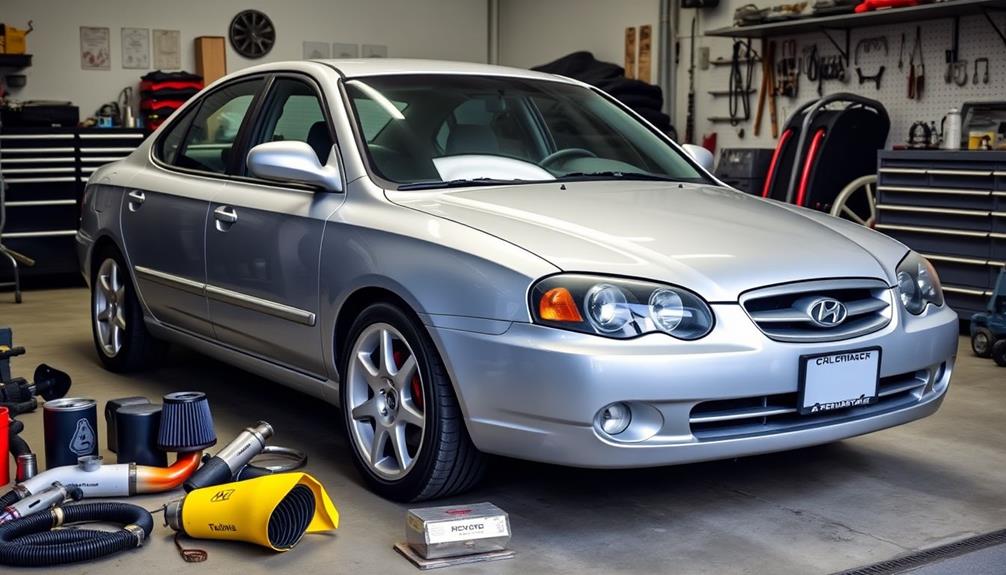
When considering the balance between cost and performance for your 2004 Hyundai Elantra, you'll quickly find that achieving notable horsepower gains can be a pricey venture.
To boost your horsepower from 140 hp to 280 hp, you might need to invest over $12,000. If you're looking for more affordable performance upgrades, basic modifications like a cold air intake or an exhaust system can yield limited power increases, typically around 5 to 10 horsepower.
It's vital to keep an eye on the cost-to-power ratio, which averages about $37 per additional horsepower. This means that considerable performance improvements often come at a steep price.
You might consider focusing on handling enhancements instead. Mods like suspension upgrades can be achieved for around $700 and can greatly improve your driving experience without the hefty price tag of engine modifications.
Bear in mind that extensive modifications might impact your car's resale value, as the costs often aren't recouped. Plus, poorly executed upgrades could lead to reliability issues.
Balancing your investment with the expected performance gains is important to guarantee you get the most satisfaction from your tuning efforts.
Final Thoughts on Tuning

Tuning your 2004 Hyundai Elantra can be a rewarding experience, but it's essential to approach it with realistic expectations. While tuning your 2004 Hyundai Elantra can improve performance and drivability, it’s important to remember that it won’t magically transform it into a high-performance sports car. To get the most out of your tuning efforts, it’s helpful to consult resources such as the “hyundai elantra 2000 tuning guide,” which can provide specific insights and tips for maximizing the potential of your vehicle. Additionally, seeking the advice of experienced tuners or mechanics can offer valuable guidance for achieving your desired results.
While the idea of transforming your reliable sedan into a powerhouse is enticing, remember that significant performance upgrades often come with challenges and costs.
Here are four key points to contemplate:
- Start Small: Focus on basic upgrades like a cold air intake, exhaust system, or headers, which can yield modest gains of 10-15 hp.
- Understand Limitations: The CVVT system complicates ECU modifications and may limit your potential without forced induction.
- Budget Wisely: Major enhancements can cost over $12K and mightn't guarantee the performance or resale value you desire.
- Optimize with Aftermarket ECU Tuning: To maximize your upgrades, think about aftermarket ECU tuning or a MAP to counteract factory emissions settings.
Frequently Asked Questions
Can Hyundai Elantra Be Tuned?
Yes, you can tune a Hyundai Elantra, but it comes with challenges. You'll find limited horsepower gains without forced induction, and optimizing performance often requires aftermarket ECUs to counteract the factory settings.
Can You Tune a Hyundai?
Imagine a canvas waiting for your brush. Yes, you can tune a Hyundai, transforming its performance and spirit. Start small, explore options, and watch your driving experience evolve as you release its potential.
Which Elantra Has the Most Horsepower?
If you're looking for the Elantra with the most horsepower, the 2004-2006 models are your best bet. They pack a 2.0L engine delivering 138 hp, with the GT trim offering a sportier ride.
Is Hyundai Elantra Powerful?
Imagine a reliable friend who's great at getting you places, but doesn't race. The Hyundai Elantra isn't powerful like a sports car; it's designed for dependable journeys, focusing on efficiency rather than raw horsepower.
Conclusion
Tuning your 2004 Hyundai Elantra can turn your dependable sedan into a spirited companion on the road. By carefully balancing performance upgrades and costs, you'll transform your ride from a humble commuter to a lively performer, like a butterfly emerging from its cocoon. Embrace the journey, learn from the community, and don't shy away from the challenges. With the right modifications, you'll not only enhance your Elantra's power but also enjoy every twist and turn along the way.






